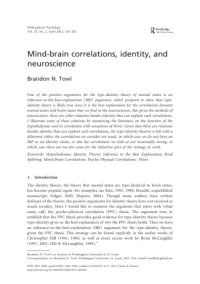
Ebook: Mind-brain correlations, identity, and neuroscience
Author: Brandon N. Towl
One of the positive arguments for the type-identity theory of mental states is an
inference-to-the-best-explanation (IBE) argument, which purports to show that type-
identity theory is likely true since it is the best explanation for the correlations between
mental states and brain states that we find in the neurosciences. But given the methods of
neuroscience, there are other relations besides identity that can explain such correlations.
I illustrate some of these relations by examining the literature on the function of the
hypothalamus and its correlation with sensations of thirst. Given that there are relations
besides identity that can explain such correlations, the type-identity theorist is left with a
dilemma: either the correlations we consider are weak, in which case we do not have an
IBE to an identity claim, or else the correlations we look at are maximally strong, in
which case there are too few cases for the inductive part of the strategy to work.
As it is known, the strategy fails for oniric sensations - dreamt thirst has been found uncorrelated, a fact pointing only the need of refining the theory exposed hereby.
One of the positive arguments for the type-identity theory of mental states is an inference-to-the-best-explanation (IBE) argument, which purports to show that type- identity theory is likely true since it is the best explanation for the correlations between mental states and brain states that we find in the neurosciences. But given the methods of neuroscience, there are other relations besides identity that can explain such correlations. I illustrate some of these relations by examining the literature on the function of the hypothalamus and its correlation with sensations of thirst. Given that there are relations besides identity that can explain such correlations, the type-identity theorist is left with a dilemma: either the correlations we consider are weak, in which case we do not have an IBE to an identity claim, or else the correlations we look at are maximally strong, in which case there are too few cases for the inductive part of the strategy to work.
One of the positive arguments for the type-identity theory of mental states is an inference-to-the-best-explanation (IBE) argument, which purports to show that type- identity theory is likely true since it is the best explanation for the correlations between mental states and brain states that we find in the neurosciences. But given the methods of neuroscience, there are other relations besides identity that can explain such correlations. I illustrate some of these relations by examining the literature on the function of the hypothalamus and its correlation with sensations of thirst. Given that there are relations besides identity that can explain such correlations, the type-identity theorist is left with a dilemma: either the correlations we consider are weak, in which case we do not have an IBE to an identity claim, or else the correlations we look at are maximally strong, in which case there are too few cases for the inductive part of the strategy to work.
Download the book Mind-brain correlations, identity, and neuroscience for free or read online
Continue reading on any device:

Last viewed books
Related books
{related-news}
Comments (0)